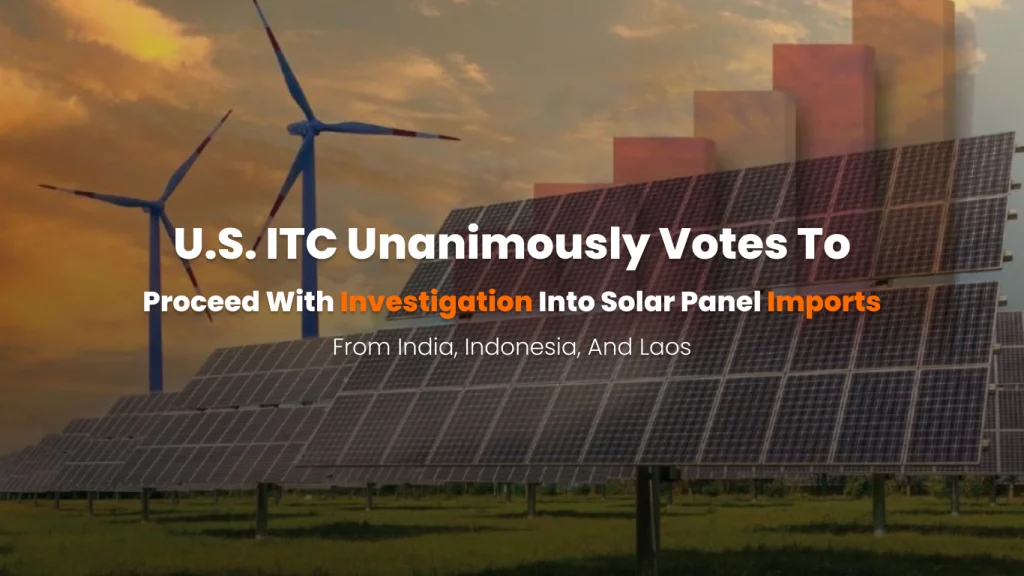The U.S. International Trade Commission (ITC) has unanimously voted to advance an investigation into solar panel imports from India, Indonesia, and Laos, amid concerns that these imports may be harming domestic solar manufacturing through unfair trade practices.
Origins of the investigation
The probe originates from petitions filed on July 17, 2025 by the Alliance for American Solar Manufacturing and Trade, representing U.S. producers such as First Solar, Mission Solar, Qcells, and Talon PV. These petitions called for both antidumping (AD) and countervailing duty (CVD) investigations targeting crystalline silicon solar cells and modules originating from the three countries.
Solar panel imports
Petitioners allege that manufacturers—particularly Chinese-owned entities operating in Laos and Indonesia, and certain Indian-headquartered companies—are dumping products into the U.S. market at prices well below fair value and receiving impermissible government subsidies. They point to a substantial increase in imports: from 2022 to 2024, solar cell exports to the U.S. soared to approximately 2.3 GW from India, 1.8 GW from Indonesia, and nearly 1.9 GW from Laos.
The petitions cite staggering alleged dumping margins: roughly 214% for India, 90% for Indonesia, and 245–249% for Laos. Commerce Department data aligns with these findings, estimating margins such as 123.04% for India, 94.36% for Indonesia, and between 123.12% to 190.12% for Laos.
Procedural timeline
The ITC has already determined that there is a “reasonable indication” of material injury to the U.S. solar industry from these imports, enabling Commerce to press ahead with its probe.
Key upcoming dates include:
- September 2, 2025: ITC to announce its preliminary injury determination.
- October 10–13, 2025: U.S. Department of Commerce to release preliminary countervailing duty conclusions.
- December 24–26, 2025: Commerce to issue preliminary findings on antidumping duties.
Should both agencies confirm affirmative preliminary findings, importers may be required to post provisional duties on incoming shipments, with final determinations potentially resulting in substantial tariffs against the three nations.
Industry and geopolitical context
This case follows earlier trade actions under the “Solar III” initiative, which targeted suppliers from Cambodia, Thailand, Vietnam, and Malaysia—leading to steep duties. The current investigation reflects broader U.S. efforts to stem the circumvention of tariffs by shifting production to countries outside the original AD/CVD jurisdictions.
Domestic manufacturers view this development as a defense of billions of dollars in investments and American jobs. Tim Brightbill, lead counsel for the petitioning alliance, emphasized the decision affirms that “U.S. solar manufacturers are being undercut and harmed by unfairly traded imports,” adding that Chinese-owned and other companies in the target countries are “gaming the system” to undercut domestic production.
Implications and forward outlook
Should the investigations result in duties, the solar market could witness supply disruptions, price increases, and shifts in sourcing strategies. For exporters in India, Indonesia, and Laos, the outcome may prompt reevaluation of trade routes. For the U.S. solar industry, the ruling may offer a reprieve amid mounting competitive pressures.
Summarily, the unanimous vote by the ITC marks a pivotal step toward resolving this high-stakes trade dispute. The decisions to follow, particularly the preliminary rulings from the Commerce Department and ITC, will be closely watched by industry stakeholders through late 2025 and beyond.




